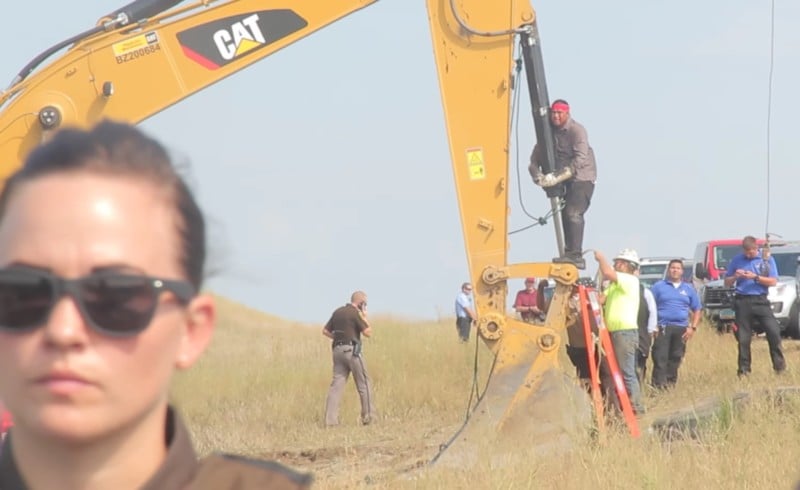Filmmakers Arrested Covering Pipeline Protests Could Face Decades in Prison
![]()
The headline might seem more at home in a totalitarian country, but it comes from right here in the United States. Several journalists and documentary filmmakers are facing serious felony charges and decades of prison time for filming oil pipeline protests in North Dakota and Washington State.
According to The Guardian, documentary filmmakers Deia Schlosberg and Lindsey Grayzel were both arrested on October 11th while covering protests in North Dakota and Washington State, respectively. New York-based Schlosberg is facing three felony conspiracy charges, and could spend up to 45 years in prison; Portland-based Grayzel and her cinematographer Carl Davis are facing a felony burglary charge, a felony “criminal sabotage” charge, and a misdemeanor trespass offense for a total of 30 years in prison.
The filmmakers’ lawyers and other free-speech advocates are calling the charges an “assault on the first amendment.” The prosecutors have conceded that the defendants were there as filmmakers, and yet they’re still pursuing aggressive charges that could land Schlosberg, Grayzel, and Davis in jail for a combined 75 years.

Grayzel and Schlosberg are not the only journalists prosecutors are going after with serious and sometimes strange felony charges. Amy Goodman, a critically acclaimed journalist and the host of Democracy Now!, faced a serious “riot” charge for covering Native American protests of the Dakota Access Pipeline until a judge recently forced prosecutors to drop the charge. And while Goodman might still face other charges from the sheriff’s department, the public is keeping a close eye on her case.
Unfortunately, independent filmmakers like Grayzel and Schlosberg don’t have nearly the political and journalistic clout that someone like Goodman has earned, making them more vulnerable.
“Everyone needs to be afraid when our first amendment rights are in jeopardy,” Grayzel told The Guardian on Thursday. “This is not just about me. This is not just about Carl. This is not about Amy Goodman … This is about the public’s right to know what is going on in this country.”
Image credits: Protest against the Dakota Access Pipeline by Fibonacci Blue, and screenshot of CC video #NoDAPL by Desiree Kane.